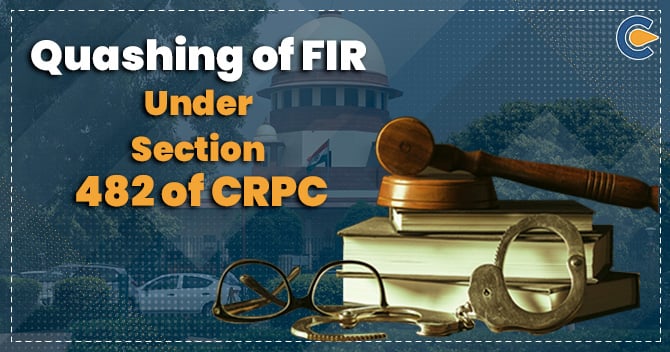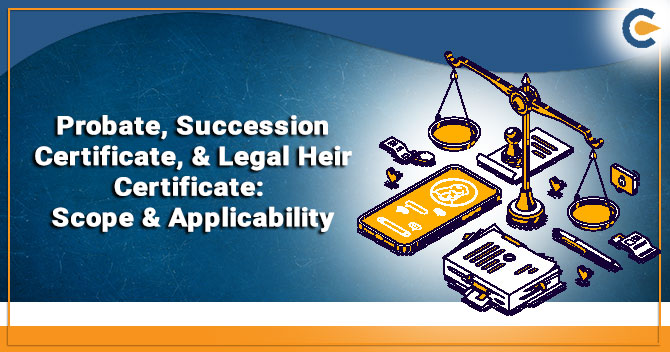The law is made to protect the safety and security of the citizens and the state and for the interests of the general public. However, in certain circumstances, due to some malicious minds, the law is being used to harass the aggrieved party by the implication of false charges.
In order to suppress the other party, fabrication of the complaints has been used as a weapon and much false FIR are lodged. The FIR can be against the individual or Company or its promoters, directors or auditors.
Section 482 of CRPC Act empowers the High Court to protect the interests of both the parties. The power to file a writ petition for the Quashi of FIR is given under Article of 226 of Constitution. The High Court, if it believes, that the FIR has been falsely filed to suppress and with the intention to trouble the aggrieved party, then it can grant Quashi of FIR in such cases.
What can be the Modus Operandi of Filing FIRs?
- Before Police under section 154 of CRPC;
- Any Complaint registered before the Superintendent of police under section 154 (3) of CRPC;
- FIR filed on the directions of the Magistrate under section 156 (3) of CRPC;
- Cognizance of Offence under section 190 (CrPC), held by the Magistrate;
- Private Complaint before the Magistrate u/s 200 (CrPc)
Quashing FIR
Quashing of FIR[1] can be filed before the High Court along with all related proceedings. The High Court can grant the quashing of FIR if it is satisfied that the FIR is filed because of the malicious intentions to suppress the aggrieved party and the same is frivolous and bogus.
Powers of High Court under section 482 (1) of the Code of Criminal Procedures:
- The power includes the right to act in any manner justifiable to make two ends of the justice meet;
- The High Court has the right to Quash the FIR once it is satisfied that the same is filed with malicious intentions to trouble the aggrieved person;
- Any person charged with the non-compoundable offence has the right under Article 226 of the Constitution to reach to the High Court and file a writ petition under section 482(1) of CrPC.
- The petitioner is under the burden to prove to the High Court that the FIR against him is filed with the malicious intention in order to aggrieve or trouble him/her.
However, the high Court has quoted following excepts to the Quashing of FIR:
- The Quashing of FIR under section 482 cannot be availed if the Code already provides the specific provisions for the redressal of the grievance of the aggrieved party.
- The powers under section 482 for Quashing of FIR shall not be abused and shall always be used for the securing the ends of justice;
- The powers under this section shall not be used to harm the provisions of any other law.
Grounds for Quashing of FIR
The grounds and conditions for Quashing of FIR as laid down by the Supreme Court are as follow:
- The FIR is eligible to be quashed if the allegations in the said FIR do not amount to any offence and is taken on entirety on the face value;
- In case the allegations quoted in the FIR is of improbable nature and so absurd that no man of prudence would do so;
- In case the allegations made in the FIR and other supporting documents do not amount to any cognizable offence whether being registered by Police under section 156 (1) or being directed by the Magistrate under section 156 (2).
- In case the allegations constitute a non-cognizable offence and not a cognizable offence, the no investigation can be probed by the police officer without the orders of the Magistrate under section 155(2).
- In case where the allegations stated in the FIR or compliant do not confirm of any offence committed or displays any case against the accused.
- Where it has been specifically mentioned in the Code that the accused can apply for Quashi under certain conditions or in some circumstances.
The subjective assessment of the Judge would be the final and concluding for quashing of FIR under section 482 of CRPC. There is a need to maintain a balance between powers of the court as implied under section 482 and the facts of the case.
Ways of Quashing an FIR
The various ways in which FIR can be quashed are enumerated as follows:
- FIR Quashing after the file of charge sheet:
The power of the High Court to quash an FIR even when the Charge-sheet of the case has been filed is being provided in section 482. The accused can appeal to the Court that no material evidence is being presented against him even after the investigation has been conducted. Taking pleas of Inherent Probability is another recourse which is being available to the accused.
- FIR Quashing on the basis of Compromise:
The High Court can Quash the FIR at any stage on the basis of compromise. The compromise can be entered into by the Complainant and the accused. In such case, a joint petition under section 482 of CRPC shall be filed by both the parties. The Court will then scrutinize the case based upon the available facts and circumstances and then shall pass the order for Quashing of FIR. The petition for Quashing can also be rejected in this case if the court is not satisfied with the facts, terms and conditions of the compromise;
- FIR Quashing in Matrimonial cases
Under Section 498 A and Section 406 of Indian Penal Code, many women files false allegations regarding cruelty by husband and his relatives. But later on the parties may conclude to a mutual settlement by preparing a Mutual Compromise deed, stating the terms of the settlement. In this case, both the parties need to be presented before the High Court for identification and recording of their statements.
In case of divorce, the Quashi of FIR is also granted once the divorce proceedings are over.
- FIR Quashing in Financial Disputes
Once theparties comes to the terms and financial disputes are settled, Quashing of FIR becomes the obvious recourse in economic offences. In case of serious offences other than the economic offences, the Quashing of FIR is done along with a Compromise Deed.
- Rights of the Acquitted Person
- The acquitted person may pray to the Court for the institution of Criminal charges against the Complainant once the FIR is quashed and he is discharged from the case;
- A complaint under section 182 (IPC) against any person who has files false information with malicious intention, can also be filed;
- An application can be filed before the Court under section 156 (3) of IPC;
- A private Complaint under section 200 (CRPC) can also be filed for false charges alleged against the accused with the malicious intention of defamation and harassment, where the charges were filed without any just or lawful ground;
- Fining of Complaint under section 211 (IPC) for the lodgement of fabricated FIR and charging with false allegations.
- Filing of Compensation under section 250 CRPC for accusation without any reasonable cause. This will apply in the case of summons and warrants as well.
In certain cases, theacquitted person can also exercise his rights against any public servant if such public servant has misused his power and taken undue advantage of it in order to harass the acquitted person.
Read our Article:Search Cases under Section 153D of the IT Act, 1961: Lawfulness of Prior approval for assessment











